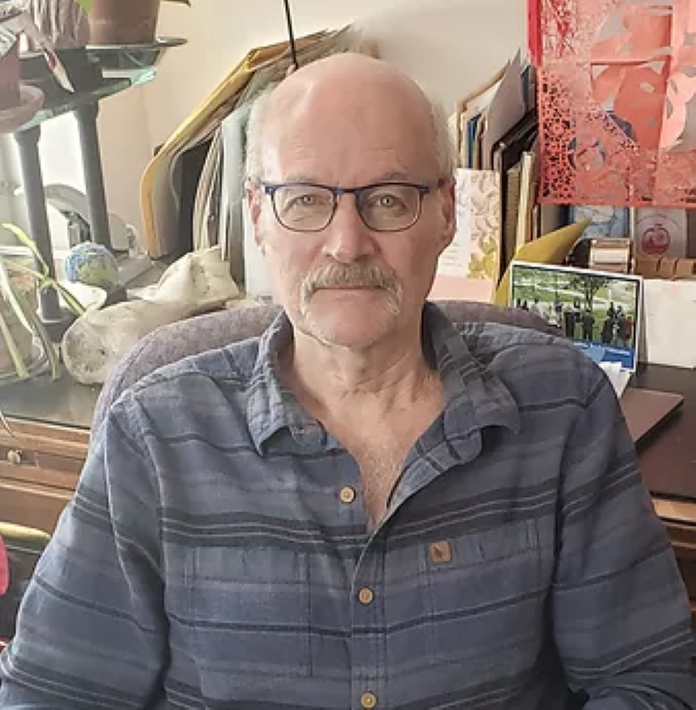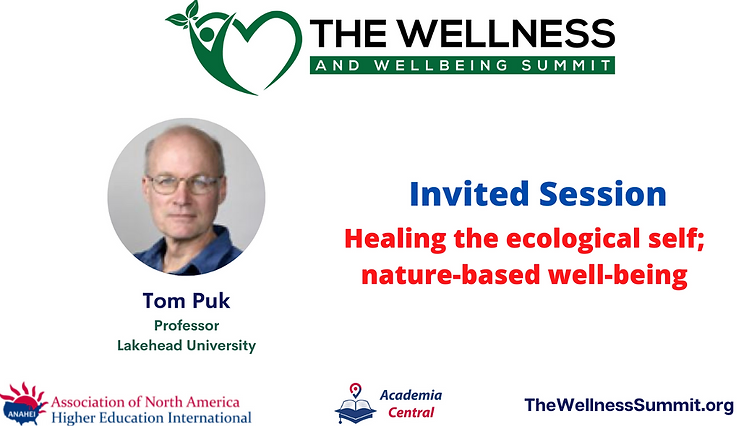Healing the Ecological Self: Nature-Based Well-Being

Session Title: Healing the Ecological Self: Nature-Based Well-Being
Speaker: Tom Puk, Professor, Lakehead University
Watch the session: https://app.knowmia.com/CpS7

Session description: Healing the Ecological Self: Nature-based Well-being Homo erectus, arguably the first humans, were closely connected with the natural world. Since that time, modern humans, at least in the industrial world, have become increasingly disconnected from their natural surroundings, resulting in a wounding of the human psyche. Healing the ecological self involves repairing this disconnect in terms of the cognitive, emotional and spiritual components of the psyche. Allopathic medicine relies on human-constructed solutions such as medicine and technology, the very components that often contribute to our disconnect from nature. Nature-based well-being as defined in this presentation, relies on nature-unplugged. The author has developed a healing model called “nature-based regenerative healing” (NBRH)(Puk, 2021) in which subjects start daily walking in natural surroundings while focusing on three components: memorizing nature-based poetry (e.g. Frost, “the Road Not Taken”), repeating healing affirmations and ecophily i.e. a connection with their natural surroundings. Before each walk, the subject climbs into a metaphorical “healing bubble” that keeps out the over-stimulation of the human-constructed world, in particular the chronic use of screens (Puk, 2021b). In the first study (Puk, 2021a), a person with years of severe lyme disease, no longer working, and having little hope in leading a healthy life, followed this model faithfully. Each day she added one minute to her daily walking. After five months, she returned to work, describing herself as a changed person. The concept of “courageous gradualism” was found to be a key component of the healing process, in that little things, conducted over a longer period of time, results in significant progress. In a second study (Puk, 2022c, in review) two post- concussion subjects followed the same model with similar healing results.This article, focusing on “nature and neurons”, goes into great detail, recounting the many benefits natural processes provide to human healing. The author is currently conducting a third study with a graduate course he developed called “nature-based well-being”. The students in this course are currently following the NBRH model with the objective of healing the negativity-bias that Homo erectus is believed to have passed on to Homo sapiens. Rather than focus on illness or cognitive impairment, each student has identified stress-related behaviors and habits they would like to heal such as anxiety, rumination, perfectionism, impulsivity and low self-esteem. They are at the same time researching their progress over an eight week period through their own autoethnography. Although presently under-represented in modern medicine, healing processes that emphasize reconnecting with nature would provide a significant, complementary contribution to human well-being.
Bio: Dr. Tom Puk is Professor, Ecological Consciousness and Nature-based Well-being, Lakehead University, Ontario, Canada. His current research focuses on an ecotherapeutic model he created, referred to as “nature-based regenerative healing”. This model utilizes the natural world as a context in the healing process. The first study (see references) involved an individual who suffered from Lyme disease. The model addressed three major symptoms: brain fog, poor focussed attention and poor short term memory. As well, healing associated negative emotions was a major objective. The second study (in review) involved two subjects who suffered from post-concussive syndrome and who also suffered from similar symptoms. The third study (in progress) involves graduate students in a course on “nature-based well-being”. This study focuses on healing negative habits, behaviors and emotions using the NBRH model. In all these studies, significant well-being progress has been achieved.
E-mail address: [email protected]
Office: 18073438110 (Ext 8710)